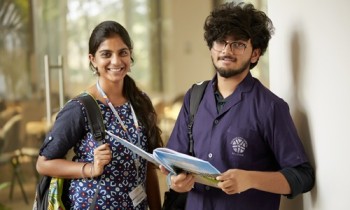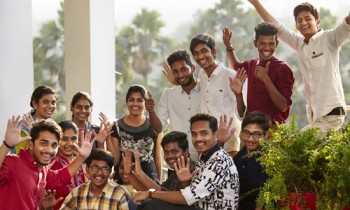- Student Outcome
- Programme Description
- Programme Structure
- Programme Enquiry
Student Outcomes (SOs) - CAC
The graduates of Computer Science & Engineering:
SO 1: Analyze a complex computing problem and to apply principles of computing and other relevant disciplines to identify solutions.
SO 2: Design, implement, and evaluate a computing-based solution to meet a given set of computing requirements in the context of the program's discipline.
SO 3: Communicate effectively in a variety of professional contexts.
SO 4: Recognize professional responsibilities and make informed judgments in computing practice based on legal and ethical principles.
SO 5: Function effectively as a member or leader of a team engaged in activities appropriate to the program�s discipline.
SO 6: Apply computer science theory and software development fundamentals to produce computing based solutions.
Student Outcomes (SOs) - EAC
The graduates of Computer Science & Engineering:
SO 1: An ability to identify, formulate, and solve complex engineering problems by applying principles of engineering, science, and mathematics.
SO 2: An ability to apply engineering design to produce solutions that meet specified needs with consideration of public health, safety, and welfare, as well as global, cultural, social, environmental, and economic factors.
SO 3: An ability to communicate effectively with a range of audiences.
SO 4: An ability to recognize ethical and professional responsibilities in engineering situations and make informed judgments, which must consider the impact of engineering solutions in global, economic, environmental, and societal contexts.
SO 5: An ability to function effectively on a team whose members together provide leadership, create a collaborative and inclusive environment, establish goals, plan tasks, and meet objectives.
SO 6: An ability to develop and conduct appropriate experimentation, analyze and interpret data, and use engineering judgment to draw conclusions.
SO 7: An ability to acquire and apply new knowledge as needed, using appropriate learning strategies.
Programme Educational Objectives (PEOs)
PEO 1: Graduates acquire extensive technical knowledge and related skills required to demonstrate themselves as professionals or pursue higher education.
PEO 2: Graduates adapt to upskilling and excel in their careers despite future technological changes, and demonstrate research aptitude to generate innovative engineering solutions.
PEO 3: Graduates acquire the potential to contribute for the field of computing as well as for the societal development by demonstrating professional, social and ethical practices
Programme Specific Outcomes (PSOs)
PSO 1: Application Development Skills: Design and development of web applications using various technologies such as HTML, JSP, PHP, ASP and ASP.NET to cater the needs of the society
PSO 2: Enrich Research Skills: Offer solutions which impact geo-socio-economic and
environmental scenario by using Machine Learning, Artificial Intelligence and IoT.
Programme Outcomes (POs)
Programme Outcomes (POs), are attributes acquired by the student at the time of graduation. The POs given in below, ensure that the POs are aligned to the Graduate Attributes (GAs) specified by National Board of Accreditation (NBA). These attributes are measured at the time of Graduation.
PO 1: Engineering knowledge: Apply the knowledge of mathematics, science, engineering fundamentals, and an engineering specialization to the solution of complex engineering problems.PO 2: Problem analysis: Identify, formulate, review research literature, and analyze complex engineering problems reaching substantiated conclusions using first principles of mathematics, natural sciences, and engineering sciences.
PO 3: Design/development of solutions:Design solutions for complex engineering problems and design system components or processes that meet the specified needs with appropriate consideration for the public health and safety, and the cultural, societal, and environmental considerations.
PO 4: Conduct investigations of complex problems: Use research-based knowledge and research methods including design of experiments, analysis and interpretation of data, and synthesis of the information to provide valid conclusions.
PO 5: Modern tool usage: Create, select, and apply appropriate techniques, resources, and modern engineering and IT tools including prediction and modelling to complex engineering activities with an understanding of the limitations.
PO 6: The engineer and society: Apply reasoning informed by the contextual knowledge to assess societal, health, safety, legal and cultural issues and the consequent responsibilities relevant to the professional engineering practice.
PO 7: Environment and sustainability: Understand the impact of the professional engineering solutions in societal and environmental contexts, and demonstrate the knowledge of, and need for sustainable development.
PO 8: Ethics: Apply ethical principles and commit to professional ethics and responsibilities and norms of the engineering practice.
PO 9: Individual and team work: Function effectively as an individual, and as a member or leader in diverse teams, and in multidisciplinary settings.
PO 10: Communication: Communicate effectively on complex engineering activities with the engineering community and with society at large, such as, being able to comprehend and write effective reports and design documentation, make effective presentations, and give and receive clear instructions.
PO 11: Project management and finance: Demonstrate knowledge and understanding of the engineering and management principles and apply these to one's own work, as a member and leader in a team, to manage projects and in multidisciplinary environments.
PO 12: Life-long learning: Recognize the need for, and have the preparation and ability to engage in independent and life-long learning in the broadest context of technological change.
| I Year (R21 Regulation) | I Semester | |||||
|---|---|---|---|---|---|---|
| Code | Subject | L | T | P | C | |
| 21HS103 | Engineering Mathematics - I(C) | 3 | 1 | - | 4 | |
| 21HS113 | Engineering Physics (A) | 3 | - | 2 | 4 | |
| 21EE101 | Basic Electrical and Electronics Engineering | 3 | - | 2 | 4 | |
| 21ME104 | Engineering Graphics Laboratory | - | - | 2 | 1 | |
| 21CS103 | Programming for Problem Solving - I | 3 | - | 4 | 5 | |
| 21CS104 | Basics of Computer and Internet | 1 | - | 2 | 2 | |
| 21HS124 | Constitution of India | 1 | - | - | 1 | |
| 21PC001 | Physical Fitness, Sports & Games - I | - | - | 3 | 1 | |
| Total | 14 | 1 | 15 | 22 | ||
| I Year (R21 Regulation) | II Semester | |||||
|---|---|---|---|---|---|---|
| Code | Subject | L | T | P | C | |
| 21HS109 | Engineering Mathematics - II(C) | 3 | 1 | - | 4 | |
| 21CS121 | Discrete Mathematical Structures | 3 | - | - | 3 | |
| 21CS122 | Digital Logic Design | 3 | - | - | 3 | |
| 21CS105 | Programming for Problem Solving - II | 3 | - | 4 | 5 | |
| 21HS122 | English Proficiency and Communication Skills | - | - | 2 | 1 | |
| 21ME105 | Workshop Practice | - | - | 2 | 1 | |
| 21HS123 | Technical English Communication | 2 | - | 2 | 3 | |
| 21PC002 | Physical Fitness, Sports & Games - II | - | - | 3 | 1 | |
| Total | 14 | 1 | 13 | 21 | ||
| II Year (R19 Regulation) | III Semester | |||||
|---|---|---|---|---|---|---|
| Code | Subject | L | T | P | C | |
| 19HS203 | Probability & Statistics | 4 | - | - | 4 | |
| 19CS201 | OOPs through JAVA | 2 | - | 4 | 4 | |
| 19CS202 | Data Structures | 3 | - | 2 | 4 | |
| 19CS203 | Database Management Systems | 3 | - | 2 | 4 | |
| 19CS204 | Digital Logic Design | 3 | - | - | 3 | |
| 19HS204 | Environmental Science | 1 | - | - | 1 | |
| 19PC003 | Life Skills - I | - | - | 2 | - | |
| 19PC004 | Technical Seminar - I | - | - | 2 | 1 | |
| 19PC005 | Intra-Disciplinary Projects - I | - | - | 2 | 1 | |
| 19PC006 | Physical fitness, Sports & Games - III | - | - | 2 | 1 | |
| Total | 16 | - | 16 | 23 | ||
| II Year (R19 Regulation) | IV Semester | |||||
|---|---|---|---|---|---|---|
| Code | Subject | L | T | P | C | |
| 19CS211 | Operating Systems | 3 | - | 2 | 4 | |
| 19CS212 | Formal Languages & Automata Theory | 3 | - | - | 3 | |
| 19CS213 | Design & Analysis of Algorithms | 3 | - | 2 | 4 | |
| 19CS214 | Computer Organization & Architecture | 3 | - | - | 3 | |
| 19CS215 | Web Technologies | 2 | - | 2 | 3 | |
| 19MS304 | Principles of Management & Organizational Behaviour | 3 | - | - | 3 | |
| 19PC007 | Life Skills - II | - | - | 2 | 1 | |
| 19PC008 | Technical Seminar - II | - | - | 2 | 1 | |
| 19PC009 | Intra-Disciplinary Projects - II | - | - | 2 | 1 | |
| Total | 17 | - | 12 | 23 | ||
| III Year (R19 Regulation) | V Semester | |||||
|---|---|---|---|---|---|---|
| Code | Subject | L | T | P | C | |
| 19CS301 | Data Mining Techniques | 3 | - | 2 | 4 | |
| 19CS302 | Software Engineering | 3 | - | 2 | 4 | |
| 19CS303 | Compiler Design | 3 | - | - | 3 | |
| 19CS304 | Computer Networks | 3 | - | 2 | 4 | |
| 19HS205 | Softskills Laboratory | 1 | - | - | 1 | |
| Department Elective-I | 3 | - | 2 | 4 | ||
| Open Elective-I | 3 | - | - | 3 | ||
| 19PC010 | Employability skills-I | - | - | 2 | - | |
| 19PC011 | Inter-departmental Projects-I | - | - | 4 | 2 | |
| 19PC012 | Modular Course | - | - | - | 1 | |
| Total | 19 | - | 14 | 26 | ||
| III Year (R19 Regulation) | VI Semester | |||||
|---|---|---|---|---|---|---|
| Code | Subject | L | T | P | C | |
| 19CS311 | Cryptography & Network Security | 3 | - | - | 3 | |
| 19CS312 | Mobile Computing | 3 | - | 2 | 4 | |
| 19CS313 | Artificial Intelligence | 3 | - | 2 | 4 | |
| 19CS314 | Competitive Coding | - | - | 2 | 1 | |
| 19HS206 | Professional Communication Laboratory | - | - | 2 | 1 | |
| 19HS301 | Human Values, Professional Ethics & Gender Equity | 2 | - | - | 2 | |
| Department Elective-II | 3 | - | 2 | 4 | ||
| Open Elective-II | 3 | - | - | 3 | ||
| 19PC013 | Employability skills-II | - | - | 2 | 1 | |
| 19PC014 | Inter-departmental Projects-II | - | - | 4 | 2 | |
| Total | 17 | - | 16 | 25 | ||
| IV Year (R16 Regulation) | VII Semester | |||||
|---|---|---|---|---|---|---|
| Code | Subject | L | T | P | C | |
| 16CS401 | Search Engines | 3 | - | - | 3 | |
| 16CS402 | Embedded Systems | 3 | - | 2 | 4 | |
| 16CS403 | Information Security | 3 | - | 2 | 4 | |
| 16CS404 | Mobile Communications | 3 | - | 2 | 4 | |
| Department Elective | - | - | - | 3-4 | ||
| Department / Open Elective | - | - | - | 3-4 | ||
| Employability and Life Skills Elective | - | - | - | 1-3 | ||
| Total | 12 | - | 6 | 22-26 | ||
| IV Year (R16 Regulation) | VIII Semester | |||||
|---|---|---|---|---|---|---|
| Code | Subject | L | T | P | C | |
| 16CS411 / 16CS412 | Project Work / Internship | - | - | 30 | 15 | |
| Total | - | - | 30 | 15 | ||
| L=Lecture; T=Tutorial; P=Practicals; To=Total; C=Credits; |
| Programme Name | B.Tech in Computer Science and Engineering |
|
| Level | Under Graduation | |
| Programme Specific Enquiries | 0863-2344731 | |
| Admission Enrollment and General Enquiries | 0863-2344777, 1800-425-2529 |
|
| HoD Contact Number | 9840850744 | |










